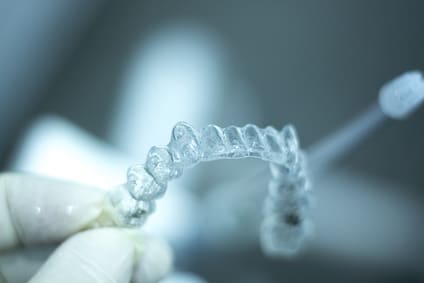
We receive a lot of questions about Invisalign, so we wanted to take the time to address some of the most common concerns.
Have you been informed by an orthodontist or dentist that you need braces? Have you been told that your teenager needs braces? Do you dislike the idea of having to wear metal brackets and wires on your teeth for a number of years? Does your teenager like the idea of wearing metal braces? If any of the preceding questions apply to you, you may have already considered the possibility of Invisalign aligners.
Nearly every day, patients present to us with inquiries about these popular clear braces, so we have decided to address five common questions about Invisalign.
How Crooked Teeth Affect Your Health
Many signs exist that your teeth might not be properly aligned, including:
- underbite, crossbite, or overbite
- protrusion, overlapping, or crowding of teeth
- jaw pain
- excessive or uneven spacing between teeth
- difficulty with brushing and flossing
- earaches and headaches
Take a look at this video from Invisalign that talks more about the effects of crooked teeth:
Orthodontic treatment is recommended in order to straighten teeth, correct many of these common issues, and to promote overall improvement in oral health.
Are you considering using Invisalign as a way to straighten and align teeth? Orthodontic work is a major dental treatment and it’s important that you have accurate information in order to make an informed decision. Here is a list of common questions and answers about Invisalign.
5 Common Questions About Invisalign Aligners
1. What Orthodontic problems can be addressed by Invisalign?
Orthodontic treatment with Invisalign has been proven effective at fixing many of the same teeth issues corrected by traditional braces. However, the degree of correction needed might also be a factor in whether clear aligners are a viable option. Certain cases of crooked teeth and/or jaw alignment issues may require wires, traditional braces, or even headgear to correct – while other cases may be fixed effectively with Invisalign braces. Talk to Dr. Eric about your specific case to determine whether Invisalign is right for you.
2. Can I use Invisalign if I am older/adult?
Adults are the most common demographic that chooses to transform their smiles with invisible braces. While traditional metal braces are becoming more common and accepted in the adult population, oftentimes a stigma or embarrassment about having braces at an older age accompanies this treatment. For this reason, many adults are seeking a clear alternative.
3. Do I need to wear a retainer following Invisalign treatment?
In order to retain desired results once the treatment has been completed, wearing a retainer is an important measure to maintain alignment. Your teeth will be kept in correct positioning with this type of device, and retainers are used following traditional braces as well as Invisalign clear braces.
4. Does Invisalign work as well as their metal counterparts?
Yes! A number of dental problems that have been corrected by traditional braces are being successfully treated with Invisalign, including: crowded teeth, widely-gapped teeth, crooked teeth, underbites, and overbites. However, in order for Invisalign treatment to be effective, you must wear them the recommended 20-22 hours per day.
5. How long will I need Invisalign treatment?
Typical treatment with Invisalign takes about a year, as long as you are wearing the trays 20-22 hours per day. While one year is the average time it takes, it’s important to keep in mind that each patient’s case is unique and your treatment course may be longer or shorter. In fact, in minor cases, the Invisalign Express program can deliver desired results in as little as 20 weeks. The only way to know for sure how long Invisalign will take in your specific case is to speak with a dentist.
Schedule a Consultation to Learn More About Invisalign Today
At Padden Dental, we are committed to educating the community about common dental problems, treatments, and procedures. We hope this information was useful to you. Please keep in mind that these are general guidelines about Invisalign, and individual results may vary. The only way to learn for sure if Invisalign is right for you or your teenager, is to schedule a consultation to learn more. Dr. Eric can’t wait to meet you to discuss treatment options, so give us a call at (360) 213-1999.
